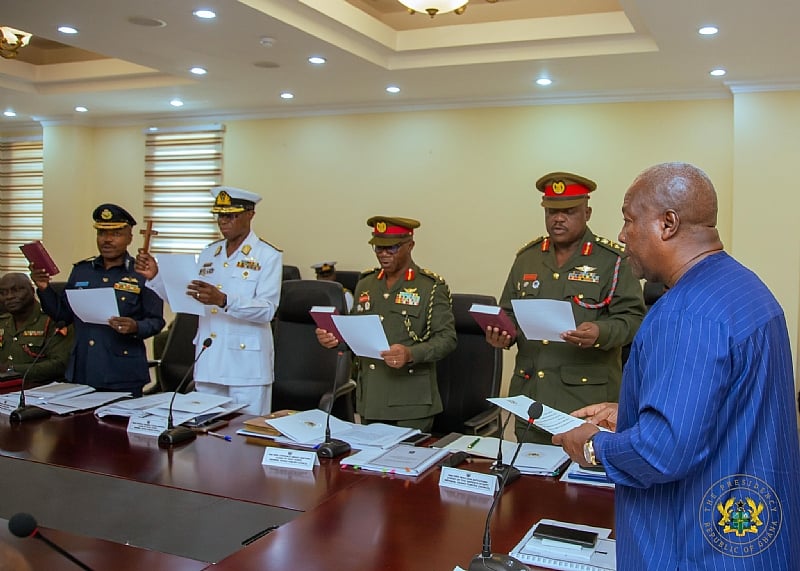The induction of new commanders into the Ghana Armed Forces Council marks a significant step in President John Dramani Mahama’s administration’s commitment to bolstering the nation’s military leadership. This carefully orchestrated transition, symbolized by the swearing-in ceremony at the Ministry of Defence, precedes a crucial Council meeting dedicated to addressing critical issues such as promotions, military upgrades, and other strategic decisions vital to the Armed Forces’ effectiveness. The newly appointed commanders bring a wealth of experience and expertise to their respective roles, poised to contribute significantly to the Council’s deliberations and the overall strengthening of Ghana’s defence capabilities. Their induction underscores the importance of maintaining a robust and adaptable military apparatus capable of safeguarding national interests and responding effectively to evolving security challenges.
The composition of the newly constituted Armed Forces Council reflects a strategic blend of leadership representing the various branches of the military. Major General William Agyapong assumes the pivotal role of Chief of Defence Staff, responsible for overseeing the overall operations and strategic direction of the Armed Forces. Major General Lawrence Kwaku Gbetanu takes charge as Chief of Army Staff, leading the ground forces and ensuring their preparedness for a wide range of operational scenarios. Rear Admiral Godwin Livinus Bessing assumes command of the Naval Staff, tasked with protecting Ghana’s maritime interests and securing its coastal waters. Air Vice Marshal Eric Agyen-Frempong takes the helm as Chief of Air Staff, responsible for maintaining and enhancing the operational readiness of the Ghana Air Force. Together, these commanders form the core leadership of the Armed Forces, entrusted with upholding the nation’s security and defending its sovereignty.
President Mahama’s address to the newly inducted commanders emphasized the paramount importance of leadership qualities essential for effectively guiding the Armed Forces. His call for “discipline, professionalism, and unwavering integrity” sets the tone for the Council’s operations and underscores the high ethical standards expected of military leadership. These qualities are not merely desirable attributes but fundamental pillars upon which the Armed Forces’ effectiveness and public trust are built. Disciplined conduct ensures adherence to established protocols and regulations, fostering a cohesive and efficient fighting force. Professionalism demands a commitment to excellence in all aspects of military operations, from training and preparedness to strategic planning and execution. Unwavering integrity reinforces the ethical foundation of the Armed Forces, ensuring that decisions are made with the utmost transparency and in the best interests of the nation.
The presence of high-ranking government officials and Council members at the swearing-in ceremony further highlights the significance of this leadership transition. Defence Minister Dr. Edward Omane Boamah, Interior Minister Alhaji Mohammed Muntaka, and Foreign Affairs Minister Samuel Okudzeto Ablakwa, along with Presidential Secretary Dr. Callistus Mahama and Special Aide Joyce Bawah Mogtari, demonstrated the government’s commitment to supporting the Armed Forces and fostering close collaboration between civilian and military leadership. This collaborative approach is crucial for effective policy-making and ensuring that the Armed Forces are adequately equipped and resourced to fulfill their mandate. The presence of these key figures symbolizes the unified approach of the government in addressing national security concerns and ensuring the seamless integration of military operations within the broader national strategy.
The Armed Forces Council, as the primary advisory body to the President on military matters, plays a crucial role in shaping the nation’s defence posture. Its responsibilities encompass a broad spectrum of issues, including the structure of the Armed Forces, personnel management, and operational efficiency. With the newly appointed commanders now formally part of the Council, the body is poised to intensify its efforts to enhance the Armed Forces’ readiness and capabilities. Regular consultations and targeted reforms will be instrumental in addressing evolving security challenges and ensuring that the military remains a well-equipped and highly trained force capable of safeguarding Ghana’s interests. The Council’s deliberations will focus on strategic planning, resource allocation, and the development of policies that strengthen the Armed Forces’ ability to respond effectively to a wide range of threats.
The induction of the new commanders marks a critical juncture in the ongoing development and modernization of the Ghana Armed Forces. The Council, under their leadership, is expected to prioritize initiatives that enhance training programs, upgrade military equipment, and improve operational efficiency. These efforts will not only strengthen the Armed Forces’ ability to defend national borders and maintain internal security but also contribute to regional stability and international peacekeeping operations. The emphasis on modernization and capacity building reflects the government’s recognition of the evolving nature of security threats and the need for a highly adaptable and technologically advanced military force. This commitment to strengthening the Armed Forces is a strategic investment in Ghana’s future, ensuring its ability to protect its interests and contribute to regional and global security.














